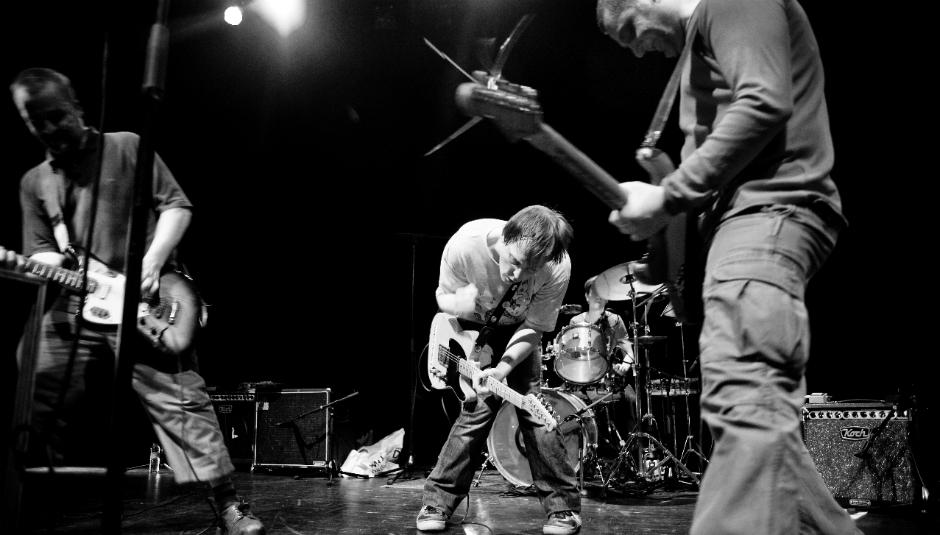In the booklet of Y’Anbessaw Tezeta, the 2012 album by Dutch avant-punk crusaders The Ex and late Ethiojazz legend Getatchew Mekuria, drummer Katherina Bornefeld tells this story of how Mekuria misconstrued the touring schedule from Groningen. In Ethiopia, twelve o’ clock means six o’ clock, so Getachew had been sitting and waiting in the hotel lobby for six hours. Nevertheless, he kept waiting. When The Ex finally came around, he was happy to see them.
The Ex is set to perform at this year’s Le Guess Who? Festival, headlining a special improv-session with an enormous cast of friends and collaborators. Since their formative years in 1979, the band has collaborated with musicians as diverse as Sonic Youth, Kamagurka, Mats Gustafsson, Fugazi, Steve Albini, and renowned Dutch improv clique Instant Composers Pool. The most notable chapter of The Ex's constantly evolving, iconoclast ways is their unique ties to Ethiopia.
In the two hours we spent with guitarist Terrie "Ex" Hessels at his pastoral Wormer Villa – with chocolate, great coffee and a whole lot of laughs – he shared many priceless stories about life in Ethiopia. But the one constant throughout it all is how connections are usually made by accident, often due to some silly error, disagreement or general misunderstanding.
Twenty years ago, in 1996, Hessels and his girlfriend Emma Fischer embarked on a year-long trip to Africa. “It was with that Land Rover over there.” Terrie points at a photograph on his wall, depicting a large motor vehicle on top of a wooden bridge that looks far too flimsy to support its weight. "But that's a whole other story!" he jeers, followed by his signature warm and infectious belly laugh. On the tail end of that prosperous year-long trot across the continent, Hessels and Fischer found themselves in Ethiopia “by accident” after unknowingly taking a sneak route.
They were arrested at the first military camp they encountered: their papers didn’t check out. “Fortunately, we were quite used to stuff like that happening to us,” Terrie casually shrugs. “They searched our car, and that's when Emma showed them this book on world music. She mentioned three Ethiopian singers, and on a whim, they were really impressed that these foreigners knew about ‘their singers’! Just like that, we were cool! They gave us food, drinks, hospitality.”
A strange, funny little country indeed, Hessels must’ve thought. Well, not little. Ethiopia is, in fact, as large as France and Spain combined. The north is predominantly highlands, whereas the south is a withered hot desert land. “Because the roads and means of communication are so scarce, the local cultures have become extremely diverse and wholesome," Hessels explains. But not without its own internal struggles. Up until the early 70s, searing hot weather forced southern communities to take grim survival measures. With too little natural resources, men sometimes had to take someone’s life once their women got pregnant.
“Fortunately, those days are long gone. That said, the south still isn’t an exactly a place to knock on the door for a neighbourly visit”, Hessels says. “In Europe, something like that is incredibly hard to imagine. Emma and I visited about twenty-three countries in 1996, and most of them are quite 'broken' in a way. The colonial era has made a pretty disastrous impact in Africa. Ethiopia, however, has never been under long term colonial rule. Its cultural diversity amongst local communities, the people and the music, it all comes from this really original place. In Ethiopia, they recognize fundamental differences between people, but they don't feel inferior or deferential in any way. They feel empowered. A lot of life revolves around music. And that's a beautiful thing.”
Terrie Ex has been to Ethiopia many times now, but he marvels about it as if it’s the first. Not long after that first trip, he met an Ethiopian professor living in The Netherlands. "He told me: 'Everyone here believes Ethiopia is this place of poverty and famine.’ So our students will remain uninformed of what's actually happening over there.'" His suggestion: The Ex should play in Ethiopia themselves.
The band first toured across Northern Ethiopia with virtuoso drummer Han Bennink, a journey nicely illustrated by Dutch documentary series Lola de Musica. In Ethiopia there are no fixed venues or even pre-planned shows; the band had to drive around and arrange gigs on the fly, with a large banner attached to their van. The Ex played a myriad of strange places; movie theatres stemming from the Italian occupation, police stations, football fields… you name it.
The Ex and Bennink opted to perform a combination of their own material and Ethiopian standards. “Initially, we felt some of the traditional songs were remarkably close in spirit to what The Ex did. The music of the Gurage tribe from the south for instance, is sensational! It was quite an intuitive process. At one point Kat (Bornefeld) sang this Mahmoud Ahmed-ballad, which got a lot of laughs because of the pronunciation. To the people there, a woman from Europe doing a song that's sung from an inherently male perspective was hilarious! That's the great thing about it, to willfully be ingenuous and give each other a good ribbing.”
One point of emphasis Terrie makes is how The Ex weren’t trying to conjure this authentic experience as some act of prestige. 'Getting it' was never part of the equation. Instead, they fumbled about like a bunch of “clumsy and oblivious foreigners”, and – more times than not – let the hilarity ensue. “It’s not our goal to deliberately bring all these different Ethiopian factions together or anything. You just need to be open and let those sparks fly naturally. When you approach it like some sort of mission, they immediately sense that. That’s wrong.”
After two tours in the vastly different northern and southern regions, The Ex introduced different types of Western music to Ethiopia. “We knew a lot of interesting, adventurous types in our inner circle and we figured it would be inspiring to hold workshops there.” The first being by ZEA, a wacky lo-fi pop outfit by Arnold de Boer, who would later replace GW Sok as lead singer of The Ex. De Boer would teach people how to make electronic beats with drum machines.
With an eclectic cast of friends and collaborators orbiting The Ex, finding that unique spark has become this never-ending quest. “We once did a workshop at this music school for blind people in Addis Ababa. Drummer Paal-Nilssen Love did this drum duel there with a blind woman who just started playing. She never even heard of jazz or anything. So she hears Paal playing…” Terrie feigns huge drum explosions as if setting off a stash of fireworks (he’s no stranger to fireworks, we might add). “And wow! The girl completely lets loose!” After belting out more hyperbolic firework sounds: “It continued like that for eight minutes...but it was incredible seeing these two different sides coming together like that.” Despite the sheer diversity in Ethiopian culture, they are naturally open-minded people, Hessels states. They don't think in opposites or absolutes, right down to fundamental life philosophies. One example would be musician Zerfu Demissie, who plays an ancient wood-carved harp known as the Begana, which produces these weirdly sci fi-sounding humming noises.
Hessels: “On paper, Zerfu’s music couldn’t be more different from The Ex. His music is rooted in Orthodox-Christian dogma, which is played on the radio during fasting time. Amazing! His father Demissie Desta was the court-player of Haile Selassie. One time we were on tour on with him, and Arnold de Boer accidentally gushed a can of beer during our two week tour in France. Zerfu was fasting at the time, which meant he couldn’t consume meat or alcohol. You’d think that’s pretty strict, but he was really flexible about it! He said: ‘Ah, if the beer is so enthusiastic, give me one as well!’ It wasn’t about the act of drinking beer, but being 'in' on the joke.”
After the Selassie era, Ethiopian music culture became generally fractured, albeit still very much alive. "During my first Ethiopian visit, the communist regime was just over. All these music stores were in shambles. Cassette tapes laid scattered across the floor, the LPs without original sleeves. It was a total mess. That's why I figured we could chip in to conserve some of that music. That's how we found out about the Ethiopiques CDs (on Paris-based label Buda Musique) issued by this French guy, Francis Falceto. The Ex wanted to help promote Ethiopian music further. Of course, you would have to do it in the native language, because that music is Ethiopian property, not French or Dutch."
Buda's Etiopiques and Terrie's own label Terp Records have been picking up some of the pieces, bringing out material by legendary singers such as Chalachew Ashenafi, Bahru Kegne, Tlahoun Gèssèssè and the aforementioned Mahmoud Ahmed. “Gèssèssè is one of THE great Ethiopian singers,” Terrie enthuses after unearthing a bunch of Ethiopiques CDs. “Interestingly enough, he and Mahmoud were virtually untouchable by dictatorship. They were both so famous and universally adored, they could do and say whatever they wanted. That’s special: when musicians essentially have more power than the government!”
Bahru Kegne (1920 - 2000) was the second ever Azmari to perform for Haile Selassie, after Negatwa Kelkay. Kegne essentially acted as free press, with unfiltered and immune freedom of speech. An Azmari is like “a combination of minstrel, a jester and poet.” Azmari performers often improvise on the masenko, a makeshift one-string fiddle, as the musical backdrop for satirical commentary on politics, religion and everyday life. The Ex personally approached Kegne’s family for approval to release a compilation of his best work.
Another example of that independent, subversive Ethiopian spirit is frequent The Ex-collaborator and saxophonist Getatchew Mekuria, who sadly passed away this year. Some of the earlier Mekuria recordings were meant as background music for restaurants, which comes as somewhat of a surprise given Mekuria's electrifying playing style: an oozing extension of his outgoing personality. He struts on stage like he owns it.
Terrie agrees: "I think that was more the idea of the producer, although I'm not quite sure. There are two cassettes actually. One of them being the Awesome Tapes From Africa, which Getatchew despised. If you played that one, he'd get really upset. The Ethiopiques 14-cassette, I really love that one. It has so many different flavours, some not so obvious. Like most Ethiopian people, Getatchew had such a breadth of personality. He could be a pouting child, he could be a brutal businessman, a gentle and gracious host, a trickster… basically everything at any given time! That's what made him such an interesting person to know. Here in The Netherlands, it's kind of devoid of people like that. Everything has to fit inside a certain mould." During the Selassie regime, forward-thinking Ethiopian musicians were left to survive by their own devices, many of them fading into obscurity. Composer/pianist Emahoy Tsegué-Maryam Guèbrou for instance, whose work will be performed by Maya Dunietz at this year's Le Guess Who? Festival. Like Zerfu Demissie, Emahoy has a connection with the Selassie communist regime. Emahoy was denied by Selassie to practice her music abroad, which sparked decades of seclusion in a monastery. Once the regime fell, she left for Jerusalem, where Dunietz eventually discovered her.
Emahoy is just one small example of the fallout. “A lot of the musicians left. That’s why a lot of musicians from those Ethiopian seventies jazz ensembles live in Washington now,” Terrie adds. “That’s really sad. We once went there with Getatchew, and the entire room was filled with all these old Ethiopian musicians. They went absolutely nuts! Getatchew stems from one generation earlier, so it was special for them to see him. They don’t have as many opportunities to play in America, because they make a living working in restaurants, or as cab drivers.” One notable example being Ethiojazz legend and cult hero Hailu Mergia, who fled to the US in the 80s before his old cassettes were reissued by Awesome Tapes From Africa. As the export of Ethiopian music gradually mounts, some of these musicians became inspired to return to the capital of Addis Ababa to perform again.
At age 13, Getatchew started to play the sax by osmosis for the Addis Municipality Band. In the aftermath of the communist regime, however, a lot of saxophones ended up collecting dust: there were hardly any people around to properly preserve these instruments. To spark some of the musical creativity, The Ex went to Ethiopia on two occasions to repair all these old rusty saxophones. “Our repairman from Amsterdam, Friso, must’ve fixed up over fifty saxophones in total. That was amazing. There were entire queues waiting by our hotel. We brought saxophone players Mats Gustafson, Ken Vandermark and Ab Baars along with us.”
The Ex weren’t the only ones making substantial attempts to revitalize and enliven things locally. The Circus Debre Berhan began as a popular Canadian humanitarian project. Circus hasn't exactly been an age old tradition in Ethiopia, yet the Circus Debre Berhan have made a lasting impact on local communities, correlating typically Ethiopian elements in music, culture and fashion with education on HIV prevention and women's rights. “After the regime fell, people wanted some new kind of entertainment. But the initiator was flagged for abuse, so the whole thing quickly collapsed. Nevertheless, a few circuses kept going. The Ex ran into one in the south, and they built this entire arena from scratch… fantastic! The performers were these strong and impressive young individuals. There are about 150 of them in total.” Circus Debre Berhan shows are often held in public areas such as markets and squares to maximize their reach. Remarkably enough, these child performers use no real protective measures: mutual cooperation, trust, solidarity, and persistence are fundamental to their stunts. Some of the acrobats even have physical disabilities or impairments, but can still do gravity-defying tricks and aerobatics.
“The crazy thing is: there’s only about four or five deaf kids total in the circus, yet everyone there learns sign language to accommodate them! We toured with them in Europe, which was an amazing experience. The guy running things now, Henok, he is a very interesting fellow. He comes from a rich family, which he left behind on his own volition to become an activist. Because he is well-educated, he has perspective and a lot of connections all over Ethiopia.” Perhaps it all boils down to that combination of perspective and connectedness to make things happen. Terrie tells a story about an Ethiopian guy who bought meat at the supermarket here, tasted it, and went back to tell the butcher because the meat tastes like water. Of course, the butcher wasn’t amused. But even if you haven’t tasted “wonderful” Ethiopian food before, next time you go to the supermarket or prepare meat, an encounter like that makes you do so with a slightly different outset. It unshackles you in this inherently positive way.
Though it’s hard to put into exact words, Terrie thinks that’s the reason The Ex and Le Guess Who? are a good match. That open, forward-thinking view on music and life is very mutual, as is that virtuous desire to connect with something outside of the comfort zone. Hessels: ”Le Guess Who? isn’t bound by one single movement and neither is The Ex. Back in 1982, we played with an Iraqi-Kurd band we met during a recording session. Just nice guys to have around, who happen to make great music. Usually it comes down to something as simple as that. Never once did The Ex try to sell people on ‘being a punk band’ or something. Because that’s never been important.”
The Ex play Le Guess Who? on Saturday 12 November 2016 together with Fendika. The band has also organised ‘The Ex Festival’ on Sunday 13 November with a cast of Ethiopian performers.























